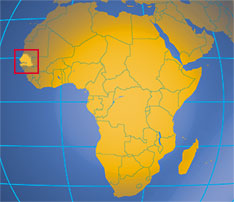From Slavery to Democracy
 The Wolof kingdoms of Senegal traded with the Portuguese as early as the 16th century, but it was the establishment of the French port of St. Louis at the mouth of the Senegal River that would change the country’s direction for the next few hundred years.
The Wolof kingdoms of Senegal traded with the Portuguese as early as the 16th century, but it was the establishment of the French port of St. Louis at the mouth of the Senegal River that would change the country’s direction for the next few hundred years.
Senegal offered the 17th and 18th century worlds two exports: slaves and gum arabic.
Generally speaking, it was the ruling class of Wolofs and their warriors that ventured inland to raid tribal villages for slaves, although of course the French military was present as a backstop of force, such as during the 1670 uprising. And although slavery was eventually abolished a century or so later, the flow of raw goods to make the colony pay for itself did not, with much of the country forced to cultivate groundnut for export.
By the 19th century, the repeated Islamic jihads from the Mali-based kingdoms further east progressively converted the Wolof kingdoms to Islam and against the French, and in response the French increasingly tightened their grip on their Senegalese subjects.
World War II proved a difficult time for the country. Initially blockaded by the Allies in order to cut off support to the German-backed Vichy French government, Senegal not only “helped” fund De Gaulle’s Free French forces, but also supplied some 100,000 combat troops that fought as part of the French-led West African Infantry, of whom some 25,000 lost their lives on Europe’s bloody battlefields.
Offered the choice by French president De Gaulle in 1958 of either total independence (with accompanied total severance from the French Union) or self-government within the French Union, the Senegalese for economic reasons voted for the latter. Two years later, however, De Gaulle relented and Senegal peacefully gained its independence from France without severing economic ties, and as such is one of France’s former colonies with the closest ties back to the old continent.
In 1981 Senegal’s inaugural president Leopold Senghor made history as the first African president to voluntarily retire (after over 20 years at the helm), passing on the office to his successor. Further elections continued amidst some controversy and conflict, until the 2000 election which was deemed by international observers to be free, fair and transparent.
Despite some remaining issues with corruption, unemployment and an on-again, off-again separatist movement in the southern region of Casamence, the Senegal is one of West Africa’s more prosperous countries. Economic reforms such as the elimination of government price controls and subsidies liberated the economy and encouraged investment, and Senegal’s economy is now one of the fastest growing in the world. Fishing, chemicals and textiles have supplanted groundnuts as exports (ironically, Senegal’s largest trading partner is India, the country I just flew in from, accounting for 26% of all exports), and as one of Africa’s most welcoming destinations, tourism has also substantially grown and added to the country’s success.
(Senegal’s most famous export, though, is probably its music, such as the mbalax form Wolof percussive popularized by Youssou N’Dour of “7 Seconds” fame, the 1994 hit single with Neneh Cherry.)
From a colonial legacy of slavery, the Senegal of today is in a wholly different world: largely considered one of Africa’s most stable political democracies, and held up as a political and economic example to follow across the continent.
 Click to subscribe via RSS feed
Click to subscribe via RSS feed
